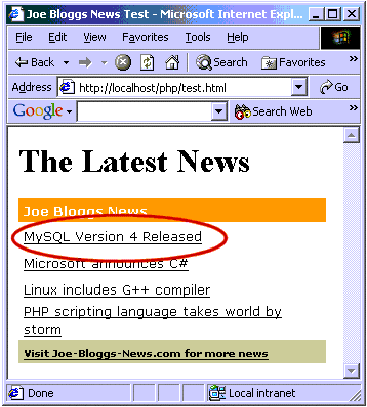Diary of A Webmaster Part 2 – Create a Content Feed
Key Takeaways
- Content feeds are a powerful tool for promoting your website, as they allow other sites to publish your content, which can drive traffic back to your site and improve your search engine rankings.
- Creating a content feed involves using PHP and MySQL to retrieve and output your site’s content in a format that can be easily embedded in other sites. This includes setting up a script that generates a dynamic content feed, which updates automatically when new content is added to your site.
- Customizing your content feed to match your site’s look and feel and adjusting MySQL queries to extract the right fields from your database can enhance its appeal. Once set up, it’s easy for others to embed your feed on their sites, offering a win-win situation for both parties.
So, you’ve spent the better part of a year creating your PHP/MySQL driven Website. You’ve got a reasonable amount of decent, flexible content, and you’re buddies with a couple of other Webmasters, so they’ve given you a free banner ad on their site in exchange for one on yours. What else can you do to promote your pièce de résistance?
A site’s promotion can be even more difficult than its development. I’ve found that one of the best ways to attract more visitors to your site is to share your content with whoever wants it. That’s right; let them publish your articles on their site (as long as they add a link back to your site near the end), write articles specifically for other Websites and ezines (hey, I’m doing that now aren’t I?), and set up a content feed from your site.
Just last week I set up a content feed similar to the one I’ll describe in this article. What’s that you say? “How do I set up a content feed? I only know PHP and MySQL!” Never fear — in this article I’ll show you how easy it is to set one up. But first, let’s discuss why you’d want to set up a content feed for your site.
Why A Content Feed?
I’ve said it before and I’ll say it again: if your site’s going to succeed on the Net, it needs to contain useful, free content targeted directly at a niche market.
Take a look at some of the most popular sites on the Web: ZDNet, Slashdot, Cnet, MoreOver, etc. All of these sites provide dynamic content feeds that anyone can use on their site, so that if I wanted to display their recent news headlines on my site, I would simply have to fill in a form and paste some HTML tags on my site, and I’d be done.
If Joe Bloggs posts the HTML code for ZDNet’s content feed on his site, then it’s a win-win situation: Joe provides valuable news to his visitors, which keeps them coming back on a daily basis, and ZDNet benefits from increased traffic when Joe’s visitors click on the news headlines to see the full story on their site.
A few reasons why you should consider creating your own content feed include:
- It’s one of the best forms of free advertising.
- Once other people post your content feed on their site, each headline actually links back to the full article your site. As many of you will know, the more links you have back to your site from other sites, the higher search engines such as Google will position you in their rankings.
- Obviously, having others post your content feed on their site will boost your traffic. By how much your traffic will increase depends on the quality of your content and how well you formulate your headlines.
Hopefully by now I’ve convinced you to set up a content feed. Let’s take a look at creating a sample content feed using some PHP and a MySQL database.
Creating a Sample Content Feed
One of the reasons why content feeds are so popular is because 99% of the time, all you need to do to include someone else’s content feed on your site is add a reference to an external JavaScript file using a HTML <script> tag, like this:
<script language="JavaScript" type="text/javascript"
src="http://www.jb-news.com/feed.php"></script>Let’s assume that I run a small Website and want to publish Joe Bloggs’s content feed on my site using the code above. In it, I’ve set the src attribute to a file named feed.php on Joe’s Website (and not a typical JavaScript file that ends with .js).
This isn’t a problem, however, because both IE and Netscape don’t care what the file extension is, provided that, when the file is grabbed, it actually contains valid JavaScript code. Let’s create a sample content feed now. To start with, load the MySQL console application and create a new database named content:
create database content;
use content;Next, create a new table named articles. This table will contain all our news items:
create table articles
(
articleId int auto_increment not null,
title varchar(100),
content text,
primary key(articleId)
);The table we’ve just created should be pretty self-explanatory. It contains three fields:
articleId, an integer which is also a primary key and unique identifier,title,which will contain the headline of each news item, andcontent,a text field that will contain the body of each news item.
Let’s add three news items to our articles table using these MySQL commands:
insert into articles values(0, 'PHP scripting language takes
world by storm', 'It was announced today that at least two
million web sites around the world are using the PHP and
MySQL language/databasing technique to create
sites that are flexible');
insert into articles values(0, 'Linux includes G++ compiler',
'Linux, one of the world's most popular operating systems,
also includes a copy of both the GCC and G++ compilers, which
allow you to compile C/C++ program easily from the
command line');
insert into articles values(0, 'Microsoft announces C#',
'Microsoft have today announced that its new .NET framework
will be based around a language named C# (pronounced
C-Sharp). This language is much like C++ but is designed
for modern prorgammers');Next, we want to create the PHP script that will retrieve the news from our MySQL database and output it to the browser so that it appears as a bunch of JavaScript code. The PHP script’s name is feed.php and it’s available for download here. We’ll concentrate only on the more important aspects of the script.
header("Content-Type: text/javascript");The first thing the script must do is declare that it will send out JavaScript code, as opposed to HTML. By default, PHP identifies the type of the output with a Content-Type: text/html header. To ensure that this script’s output is identified as JavaScript, however, we must set the header ourselves.
$db_server = "localhost";
$db_db = "content";
$db_user = "admin";
$db_pass = "password";To begin, our script creates four variables that will be used to log in to our MySQL server. I’m assuming that MySQL is installed on the same machine on which the feed.php script will be set up.
$sConn = @mysql_connect($db_server, $db_user, $db_pass);
$dConn = @mysql_select_db($db_db, $sConn);
if(!$sConn || !$dConn)
{
?>
document.write("Couldn't load news");
<?php
}Next, we use these four variables to connect to our MySQL server and select the content database. We add the “@” symbol to the beginning of the mysql_connect and mysql_select_db function calls. This tells PHP not to write any connection errors to the browser. This is important in our script, because we only want it to return valid JavaScript code.
If either the mysql_connect or mysql_select_db commands fail, then $sConn or $dConn will contain no data. We use an if control to check for this, and if either one of them failed, we output document.write("Couldn't load news"); to the browser.
document.writeis a JavaScript function. It takes one argument and outputs the contents of that argument directly to the browser.Using a PHP script to output JavaScript may seem a little strange at first, but remember what I said earlier. All the user needs to do is set up a
<script>tag whosesrcattribute references our feed.php file. As long as it returns JavaScript code, the browser will process it in the same way as it would inline JavaScript.
$nResult = mysql_query("select articleId, title from articles order by
articleId desc limit 10");Using the mysql_query function with a select statement returns the articleId and title fields for the ten articles most recently added to the articles table. The limit keyword makes sure that only ten are returned.
To actually output the news headlines as part of a HTML table, we use a PHP while loop and output several calls to JavaScript’s document.write function to build the table’s rows, like this:
while($nRow = mysql_fetch_array($nResult))
{
?>
document.write('<tr>');
document.write(' <td>');
document.write(' <a target="_blank"
href="http://www.jb-news.com/news.php?newsId=<?=$nRow["articleId"]?>"
><?=addslashes($nRow["title"])?></a>');
document.write(' </td>');
document.write('<tr>');
<?php
}There’s nothing special about this while loop. It uses PHP’s mysql_fetch_array function to retrieve the next record from the $nResult result set and outputs a table row that contains a hyper-linked news headline.
The actual URL of each headline points to http://www.jb-news.com/news.php and includes the ID of the article tacked onto the end. You can change that URL to a script on your PHP server and display the news based on the value of the newsId query string value. That’s outside the scope of this article, however.
One important thing to note about the code inside the while loop is that it uses PHP’s addslashes function to convert any single quotes in the title to escaped single quotes by adding a backslash to them. If we were to output an un-escaped quote as part of the argument to document.write, then when that code was processed by JavaScript, it would assume that the quote marked the end of the argument, causing a JavaScript syntax error.
Sample output for one of the news items using the while loop looks like this:
document.write('<tr>');
document.write(' <td>');
document.write(' <a target="_blank"
href="http://www.jb-news.com/news.php?newsId=3"
>Microsoft announces C#</a>');
document.write(' </td>');
document.write('<tr>');That’s actually all we need to do to create a content feed from our sample MySQL database. Let’s now set up the content feed and test it in our browser.
Testing Our Content Feed
To test our content feed is simple. First, make sure that the feed.php script is in a directory within your Web server’s document folder structure. Next, create a new HTML file named test.html and save it in the same directory as the feed.php script (I’ll assume that you’ve saved them both in the /php subdirectory of your Web server’s root directory). Enter the following HTML into test.html:
<html>
<head>
<title> Joe Bloggs News Test </title>
</head>
<body bgcolor="#FFFFFF">
<h1>The Latest News</h1>
<script language="JavaScript" type="text/js"
src="feed.php"></script>
</body>
</html>Run test.html in your Web browser. Assuming you used our sample feed.php, which contains additional code to format the results, the page should look something like this:

If you have a registered domain name (such as mysite.com) that points to a Web server running PHP and MySQL, then try to create the content database on that server. Upload the feed.php script too. While keeping the test.html file on your local machine, replace its src attribute to point to the feed.php script on your Web server. Then run test.html in your browser — it should appear exactly as before.
What makes our content feed dynamic?
Many things. The fact that we have complete control over the feed.php script on our server means that we may change anything we like in it (e.g. to include a sponsor’s ad). Any sites that already use our content feed won’t have to do a thing to get the updated version, because it’s retrieved from our server every time it’s displayed on their site.
Also, whenever we add a new item to our articles table, it will appear at the top of the content feed. Let’s try adding one now. Using the MySQL console application, enter this query:
insert into articles values(0, 'MySQL Version 4 Released', 'Today,
MysQL AB have released MySQL version 4. It comes packed with a number
of new features including transactions and faster
query execution plans');Return to your browser and hit the refresh button; notice the new entry in the list of news stories:

It’s just as easy to remove items from our content feed using the MySQL delete command:
delete from articles where articleId < 3;This would remove those articles whose articeId was less than three, thus leaving two news headlines in our feed:

So, as you can see, using the <script src="..."> method to include the JavaScript generated by our feed.php script in other sites’ pages ensures that any new records we add will automatically be visible in the content feed when it’s displayed.
Conclusion
Take the sample content feed described throughout this article and modify it to match the look and feel of your site. You’ll also need to modify the MySQL queries to extract the right fields from your database.
Once you’ve customised the script for your needs, tell everyone about it: your ezine subscribers, friends, other Webmasters, etc. You’ll be amazed by how many of them will agree to post it on their site because it’s so simple to do.
Remember, all that anyone needs to do to get your content feed is include HTML code similar to the following (with the URL of your feed.php file, of course) in any page of their site:
<script language="JavaScript" type="text/javascript"
src="http://www.jb-news.com/feed.php"></script>Frequently Asked Questions (FAQs) about Creating a Content Feed
How can I create a content feed for my website?
Creating a content feed for your website involves several steps. First, you need to decide what type of content you want to include in your feed. This could be blog posts, news articles, videos, or any other type of content that you regularly publish. Once you’ve decided on the type of content, you need to create an RSS feed. This is a type of web feed that allows users to access updates to online content in a standardized, computer-readable format. There are many online tools available that can help you create an RSS feed. Once your feed is set up, you can then add it to your website using a feed reader or aggregator.
What is the importance of a content feed?
A content feed is crucial for several reasons. It allows your users to stay updated with your latest content without having to constantly check your website. This can increase user engagement and keep your audience coming back for more. Additionally, content feeds can help improve your website’s SEO. By regularly updating your feed with fresh content, you can help boost your website’s visibility in search engine results.
How can I make my content feed more engaging?
There are several ways to make your content feed more engaging. One way is to include a variety of content types, such as blog posts, videos, and infographics. This can help keep your audience interested and engaged. Additionally, you can use catchy headlines and compelling descriptions to draw in your readers. Finally, consider including social sharing buttons in your feed to encourage your audience to share your content with their networks.
Can I customize my content feed?
Yes, you can customize your content feed to suit your needs. This can include deciding on the type of content to include, the frequency of updates, and the layout of the feed on your website. Many feed creation tools offer customization options, allowing you to tailor your feed to your specific requirements.
How can I add a content feed to my website?
Adding a content feed to your website can be done using a feed reader or aggregator. These tools can take the RSS feed you’ve created and display it on your website in a user-friendly format. There are many feed readers available, both free and paid, so you can choose one that best fits your needs.
How can I promote my content feed?
Promoting your content feed can be done in several ways. You can include a link to your feed on your website, in your email newsletters, and on your social media profiles. Additionally, you can submit your feed to RSS directories, which can help increase its visibility.
Can I monetize my content feed?
Yes, there are several ways to monetize your content feed. This can include displaying ads in your feed, offering premium content for a fee, or using affiliate marketing links.
How can I track the performance of my content feed?
Tracking the performance of your content feed can be done using analytics tools. These can provide insights into how many people are subscribing to your feed, which content is most popular, and how your feed is contributing to your website’s overall traffic.
Can I integrate my content feed with other platforms?
Yes, many feed readers and aggregators offer integration with other platforms. This can allow you to automatically share your feed content on social media, or include it in your email newsletters.
What should I do if my content feed is not updating?
If your content feed is not updating, there could be several reasons. This could be due to a problem with your RSS feed, your feed reader, or your website. You should first check to make sure your RSS feed is working correctly. If the problem persists, you may need to contact your feed reader provider or your website host for assistance.
Mitchell is the co-founder and product manager at BigCommerce—SaaS ecommerce software which is used by thousands of businesses to sell online. He can be reached via email at mitch@bigcommerce.com